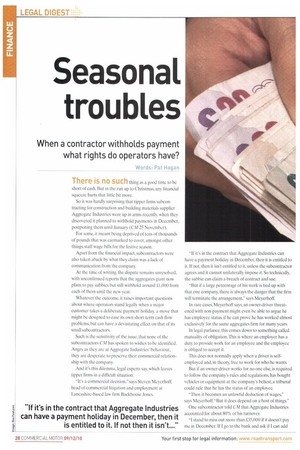Seasonal troubles
Page 28

Page 29

If you've noticed an error in this article please click here to report it so we can fix it.
When a contractor withholds payment what rights do operators have?
Words: Pat Hagan There is no such thing as a good time to be short of cash. But in the run up to Christmas, any financial squeeze hurts that little bit more.
So it was hardly surprising that tipper firms subcontracting for construction and building materials supplier Aggregate Industries were up in arms recently, when they discovered it planned to withhold payments in December, postponing them until January (CM 25 November).
For some, it meant being deprived of tens of thousands of pounds that was earmarked to cover, amongst other things, staff wage bills for the festive season.
Apart from the financial impact, subcontractors were also taken aback by what they claim was a lack of communication from the company.
At the time of writing, the dispute remains unresolved. with unconfirmed reports that the aggregates giant now plans to pay subbies but still withhold around £1.000 from each of them until the new year.
Whatever the outcome, it raises important questions about where operators stand legally when a major customer takes a deliberate payment holiday, a move that might be designed to ease its own short-term cash flow problems, but can have a devastating effect on that of its small subcontractors.
Such is the sensitivity of the issue, that none of the subcontractors CM has spoken to wishes to be identified. Angry as they are at Aggregate Industries' behaviour, they are desperate to preserve their commercial relationship with the company.
And it's this dilemma, legal experts say. which leaves tipper firms in a difficult situation.
"It's a commercial decision," says Steven Meyerhoff, head of commercial litigation and employment at Lancashire-based law firm Backhouse Jones. "If it's in the contract that Aggregate Industries can have a payment holiday in December, then it is entitled to it. If not, then it isn't entitled to it, unless the subcontractor agrees and it cannot unilaterally impose it. So technically, the subbie can claim a breach of contract and sue.
"But if a large percentage of his work is tied up with that one company, there is always the danger that the firm will terminate the arrangement," says Meyerhoff.
In rare cases, Meyerhoff says, an owner-driver threatened with non-payment might even be able to argue he has employee status, if he can prove he has worked almost exclusively for the same aggregates firm for many years.
In legal parlance, this comes down to something called mutuality of obligation.This is where an employer has a duty to provide work for an employee and the employee is obliged to accept it.
This does not normally apply when a driver is selfemployed and, in theory, free to work for who he wants.
But if an owner-driver works for no one else, is required to follow the company's rules and regulations, has bought vehicles or equipment at the company's behest, a tribunal could rule that he has the status of an employee.
"Then it becomes an unlawful deduction of wages," says Meyerhoff. "But it does depend on a host of things" One subcontractor told CM that Aggregate Industries accounted for about 80% of his turnover, "I stand to miss out more than 05,000 if it doesn't pay me in December. If I go to the bank and ask if I can add that amount to my overdraft facility, they will just say no," he explains.
"1 work to a budget and I know when my money is coming in and how much is coming in. If that stops I cannot afford to run my wagons or pay my drivers. Yet I've had nothing in writing from Aggregate Industries" Another said although he can produce evidence that he has been paid on the 10th of each month for the past two years, when he examined his paperwork from Aggregate Industries, it makes no reference to when it will pay.
"It has pages and pages on health and safety but says nothing at all about payment," he says.
Nick Clarke, from Chester-based law firm Aaron and Partners, says many subcontractors may he operating under standard trading terms drawn up by bodies such as the Road Haulage Association, rather than a bespoke contract with quarry firms.
"That would be the start point in terms of looking at where an operator stands legally," says Clarke.
"If that sets out the terms of payment as so many days after the date of invoice and Aggregate Industries does not comply, then it could be argued it is in breach of contract and could be sued.
"But where does that get the operator? There's no real benefit in aggravating the company."
In the worst case scenario, Clarke says, there might be grounds for exercising lien — a legal term used to describe withholding the other party's goods or property in lieu of payment. "But then again, if you do that you can kiss goodbye to your commercial relationship."
Instead, the consensus of opinion is that subcontractors should apply pressure through their trade representatives.
The RHA has already condemned the planned action by Aggregate Industries and taken up the matter with the Department for Transport and the Department of Business. Innovation and Skills.
Jack Semple, RHA director of policy, condemns the "flagrant abuse" of the system by large firms.
"We are asking the government to make it crystal clear to the companies involved that such behaviour is unacceptable, particularly if they wish to continue involvement in public sector projects" A spokesman for Aggregate Industries refused to confirm or deny plans to withhold all or some of the money owed to subcontractors.
"We consider it a private matter and have nothing to say," he said. is
























































































































